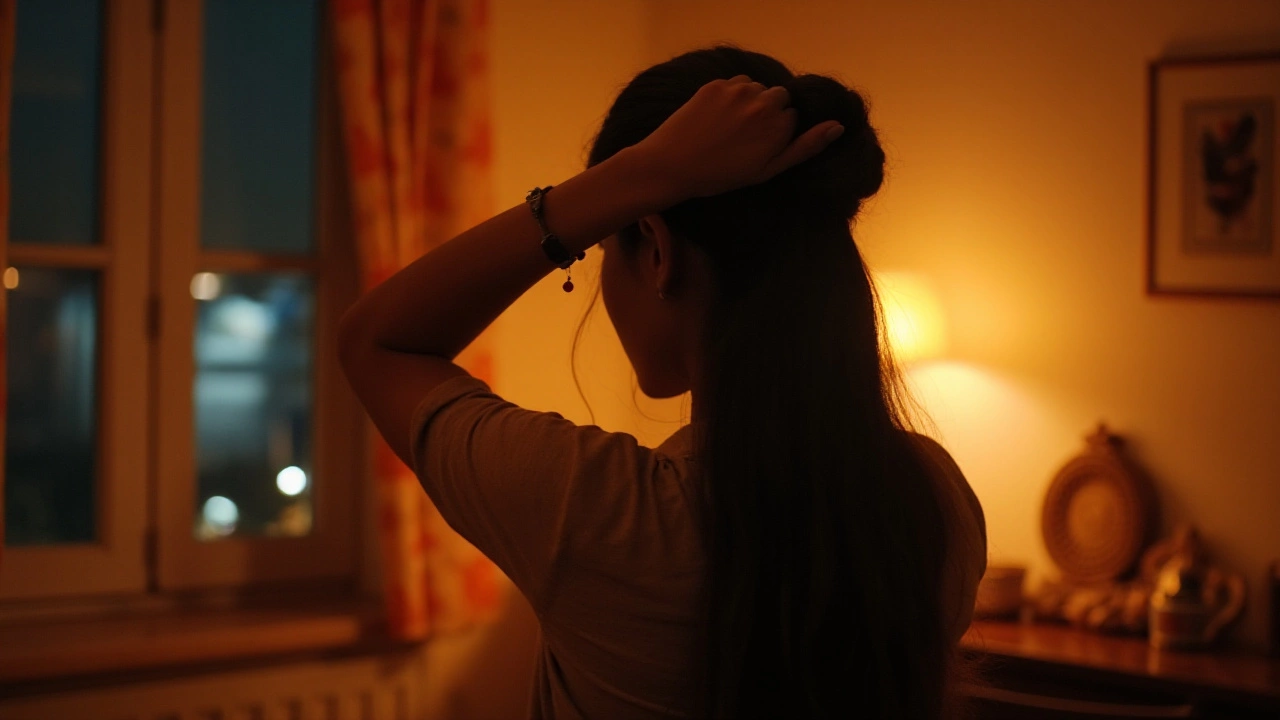
Trying to determine whether to wash your hair at night or in the morning isn’t just about convenience. It’s about finding what fits best with your hair's needs and your lifestyle. Time of day can influence not just your locks' appearance but their health, too. Each option has its unique perks and potential drawbacks.
In this piece, we'll delve into why some people swear by a bright, fresh morning wash while others prefer the calm of an evening cleanse. You’ll gain practical insights for aligning your hair care routine with your daily schedule and hair type. Let’s uncover the secrets to maximizing your hair’s natural beauty at every hour.
- Benefits of Morning Hair Washing
- Advantages of Washing Hair at Night
- Factors Influencing Your Ideal Hair Washing Time
- Consequences of Inconsistent Washing Patterns
- Tips for Enhancing Your Hair Washing Routine
Benefits of Morning Hair Washing
Washing your hair in the morning offers several appealing benefits that many enthusiasts of early-day beauty rituals swear by. One of the primary advantages is the refreshing start it provides. Kicking off your day with clean, wet hair can invigorate your senses and set a positive tone. As you lather and rinse, you wash away any remnants of sweat and oil buildup from the night, giving your hair a fresh bounce. This clean slate is particularly beneficial for those living in bustling urban environments where pollutants can quickly settle on hair and scalp. A morning wash acts as a natural wake-up call that leaves you feeling alert and ready to face whatever the day holds. With uncluttered locks, styling becomes less of a chore and more of a delightful morning ritual.
There's also a practical reason many opt for morning hair care: time efficiency. Style-seekers who prefer natural looks or need hair to dry in a particular shape throughout the day find morning washing indispensable. Plus, those who use heat styling tools can take advantage of natural light to finesse their look. Hair products like mousse or spray often work better on clean, damp hair, lending a hand in crafting resilient styles. According to renowned stylist Jenna Mast, "A morning wash allows products to meld seamlessly with hair's natural texture, helping create more durable styles that last the whole day."
"Embrace your hair’s natural texture by allowing it to air dry after a morning wash. This reduces damage and enhances its natural shine," suggests hairstylist Leroy Francis.Keeping your hair looking polished throughout the day is less hassle when it starts on a fresh note. Morning washers often report feeling more put-together and confident facing tasks both big and small, proving that the benefits extend beyond aesthetics.
Weather and lifestyle also play roles in determining the ideal hair washing time. Morning routines align well with those who exercise prior to starting work, as sweat and oils accumulate quickly during physical activity. Post-workout washing can be crucial for hygene as it helps remove these residues, reducing the risk of skin irritation or unwanted body odors. Additionally, in warmer months or climates, multiple morning showers can alleviate stickiness and refresh your scalp. This is particularly appealing for individuals balancing busy schedules and needing a boost first thing in the morning. Morning hair washing not only cleanses but psychologically prepares you for a successful day ahead. The anticipation of clean, voluminous hair can drive you to wake up a little earlier, transforming your morning regimen into a cherished part of your daily life.
| Data on Morning Hair Washing | |
|---|---|
| 75% | Reported feeling more alert |
| 65% | Less use of heat styling tools |
| 55% | Improved confidence levels |
Advantages of Washing Hair at Night
Many people find washing their hair at night to be a soothing way to transition from a busy day into a restful evening. This rhythm allows time to detox not just the locks but also the mind, offering a personal ritual that’s unrushed and serene. The peace of night-time creates the ideal environment for indulging in thorough hair care without the pressure of the day’s schedule hanging over your head.
Washing your hair at night frees up your morning routine, offering the coveted extra minutes of sleep or leisurely breakfast time. With hair care products often needing time to settle and fully absorb, washing at night gives your hair the opportunity to benefit more extensively from their properties. Leaving a conditioning product or hair mask in overnight can enhance their effectiveness, making hair soft and manageable by sunrise.
Night time washing can also reduce heat damage. Instead of blow-drying in a rush for work or school, hair can air dry naturally overnight. Embracing air-drying limits damage from heat tools, and can lead to stronger, healthier hair in the long term. For those with curly hair, this can be particularly beneficial, as avoiding heat retains curl patterns and prevents frizz.
“Sometimes, the simplest rituals are the most rewarding. Washing my hair at night lets my natural oils do their job overnight. I wake up with hair that both looks and feels healthier,” says renowned hair care specialist and stylist Jenna Combs.
For those who experience nighttime heat or sweat, washing hair at night can ensure that pillowcases stay cleaner, preventing oils from transferring to the face and potentially causing breakouts. Meanwhile, the moisture from freshly washed hair provides a cooling effect that some find helps in falling asleep faster.
Let's not forget about the evening maintenance—or the lack thereof. Once the hair is washed and set for the night, there’s no need to constantly check for styling mishaps during the day. Instead, you can focus on winding down and getting into relaxation mode. As the sleep cycle nourishes the body, it also helps in gently nurturing the hair, resulting in a natural bounce that carries through the subsequent day.
Of course, each individual's hair is unique, and experimenting with night-time washing can lead to surprising discoveries about your hair's specific rhythm. Whether it’s the natural shine or the added volume you’re after, starting a ritual of washing your hair at night might turn out to be that simple change in your hair care regime you've been searching for.

Factors Influencing Your Ideal Hair Washing Time
Deciding the best time to wash your hair goes beyond personal preference. It hinges on several critical factors that intertwine with your lifestyle, hair care goals, and environmental conditions. For starters, your daily schedule can be a significant determinant. Morning people might revel in a refreshing wash that wakes you up and makes your hair pop with the much-needed volume, thanks to the stimulation of blood flow to the scalp. This invigorating start might set the tone for a productive day. On the flip side, those juggling tight morning routines might find themselves in a bind, risking rushed washes that lead to insufficient rinsing and potential product buildup.
The time you choose is also affected by your hair type and texture. For instance, naturally oily hair might benefit from morning washes to control and reduce greasiness. This strategy allows the scalp to stay fresh for the day. Conversely, individuals with dry or curly hair often find solace in washing at night, as it provides the opportunity for natural oils to distribute evenly by the morning, enriching their healthy hair with moisture and preventing frizz.
If your environment or activities make you sweat heavily, say through regular exercise or a hot climate, washing your hair at night could provide a cleaner start the next day. This is particularly crucial as sweat can contribute to scalp irritation and undesired texture changes in your hair. Moreover, scientists often emphasize the impact of airborne pollutants, which vary throughout the day, affecting the optimal time for hair washing. Morning showers might wash away overnight sweat but could expose your clean strands to daytime pollution.
"Understanding your hair and its needs is foundational. Each individual’s hair responds differently to environmental and lifestyle stimuli," explains renowned dermatologist Dr. Mia Jordan.
Additionally, consider your bedtime routine. If you're the kind of person who takes pleasure in pampering yourself to unwind after a long day, night washing fits perfectly into a self-care regimen. It offers a serene, ritualistic experience, where you can enjoy the scent and texture of freshly washed hair as you drift into sleep. However, sleeping on wet hair could lead to weaker hair shafts and tangles come morning, a point worth deliberating.
Lastly, the use of specific hair care products can dictate the timing. Morning washes might make more sense if your routine involves lightweight products that offer protection from UV rays or pollutants. While richer conditioning treatments, leave-ins, or overnight masks better complement evening washes, giving them ample time to work their magic without disturbances or external exposure.
Consequences of Inconsistent Washing Patterns
Finding the perfect balance between when and how often to wash your hair is crucial for maintaining healthy hair. Frequent changes in your wash schedule can lead to a variety of unwanted outcomes, particularly affecting your hair and scalp’s natural balance. By keeping an inconsistent washing routine, you risk disrupting your scalp's oil production. Your scalp naturally produces oils that are essential for healthy, shiny hair. When your wash routine is erratic, oil levels can either become excessively high, leading to greasiness, or too low, causing dryness and irritation.
Moreover, unpredictable washing times can confuse your hair care products' effectiveness. Many shampoos and conditioners are formulated to work best when applied at regular intervals. If you keep changing your washing days, these products might not perform optimally, leading to hair that feels flat, lifeless, or difficult to style. Remember that hair, much like skin, benefits from consistency and precision. People with longer hair, in particular, may notice increased split ends and breakage. Damage occurs when oils are stripped too frequently or insufficiently replace moisture in cases of under-washing.
Psychologically, sticking to an inconsistent washing schedule can create unnecessary stress. Some individuals find that having a set routine offers a sense of structure and wellness, which promotes better hair health by encouraging proper care routines. Inconsistencies not only disrupt your beauty regimen but can also chip away at your confidence. On social outings, during work presentations, or simply while running errands, well-tended hair often enhances one's self-esteem, cultivating positivity throughout the day.
"Finding a hair washing schedule that works for you isn't just self-care; it's a commitment to personal well-being," advises Cheryl Simmons, a well-known expert in hair physiology and care.
In summary, adopting a regular washing schedule tailored to your hair type and lifestyle is more than a habit; it’s a foundational aspect of looking after both scalp and strands. Whether your choice is morning or evening, consistency ensures you’re maximizing the benefits of your meticulous hair care routine. By staying committed to a consistent washing routine, you’re billing yourself into a routine that can deliver the shiny, vibrant results you desire from your hair care practices.

Tips for Enhancing Your Hair Washing Routine
Washing your hair can sometimes feel like a mundane task, but it’s an essential ritual for maintaining healthy and vibrant locks. The result of your efforts largely depends on practicing good habits, which can make all the difference between dull strands and a vibrant mane. To start with, always consider the type of hair care products you’re using. Shampoos and conditioners are tailored for different hair types, such as oily, dry, or color-treated hair. Ensuring you are using the right products is crucial to enhancing the impact of your washing routine.
Timing is another pivotal factor. Whether you're someone who washes their hair in the morning to infuse it with energy and bounce or prefers the night-time calm to give it a thorough cleanse, consistency in your schedule can lead to better results. Hair experts suggest that leaving ample time between washes allows your natural oils to nourish your hair, making it softer and healthier. If daily washing is your norm, consider reducing the frequency to every couple of days, and you might see less frizz and breakage.
"The body's natural oils are the best conditioner for your hair," says Trisha Willows, a renowned stylist.
Water temperature is often overlooked but plays a significant role in your hair washing routine. Luke-warm water is ideal for loosening dirt and product buildup without stripping your hair of essential moisture, while a quick cold-water rinse at the end can help seal the cuticle and enhance shine. Incorporate scalp massages while washing, which can increase blood circulation and promote healthy hair growth. Be gentle to prevent unnecessary stress on the hair follicles that can lead to hair loss.
It’s worth investing in a microfiber towel or an old T-shirt for drying. Traditional towels can be harsh and lead to friction, which contributes to frizz and damage. Patting your hair dry gently or allowing it to air dry will preserve its natural texture and minimize split ends. Additionally, brushing your hair before washing can help reduce tangling during the process. Opt for a wide-tooth comb in the shower when your hair is wet to prevent breakage, starting from the ends and slowly working your way up.
Keep an eye on your products: build-up is inevitable when using styling products regularly. A clarifying shampoo once a month can help cleanse your hair of residues that drag it down. Remember to follow this deep clean with a hydrating conditioner to replenish moisture. For those who are adventurous with their hairstyles or frequently use heat styling tools, consider a hair mask once a week to repair and protect your tresses from damage.
Finally, it's all about listening to your hair. Your genetics, environment, and lifestyle all influence your optimal routine. What works wonders for your best friend may not suit you at all, so be open to experimenting. Switch up your products or techniques regularly to see what keeps your hair happiest. Healthy hair routines are as unique as the individuals practicing them, so personalizing your approach is integral to success.
 Hair Care
Hair Care